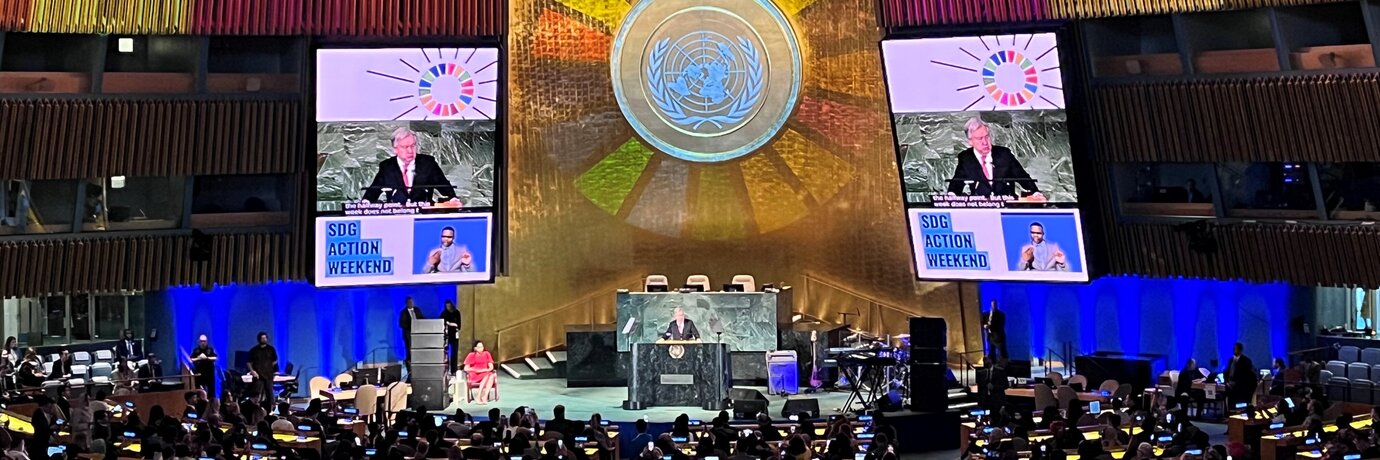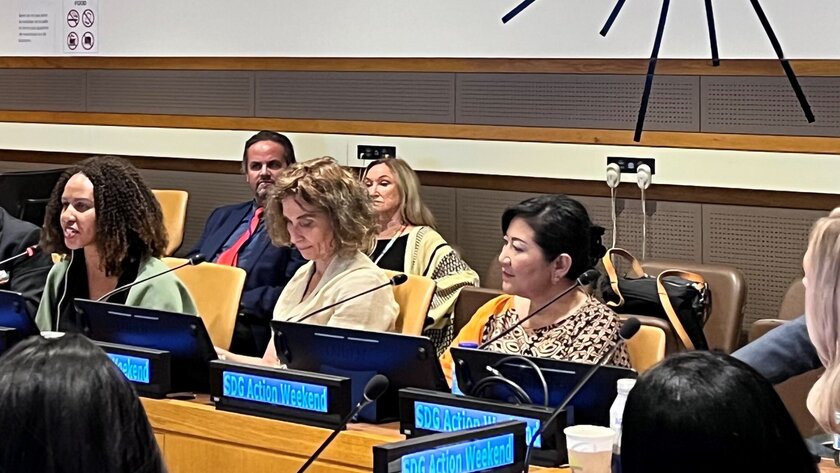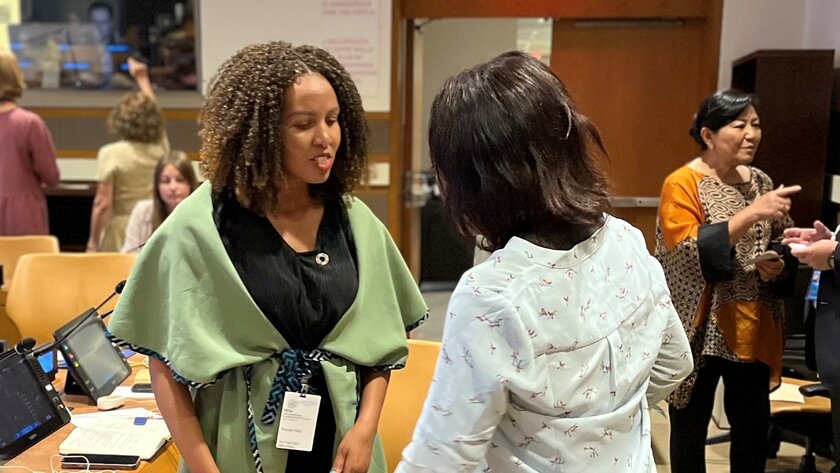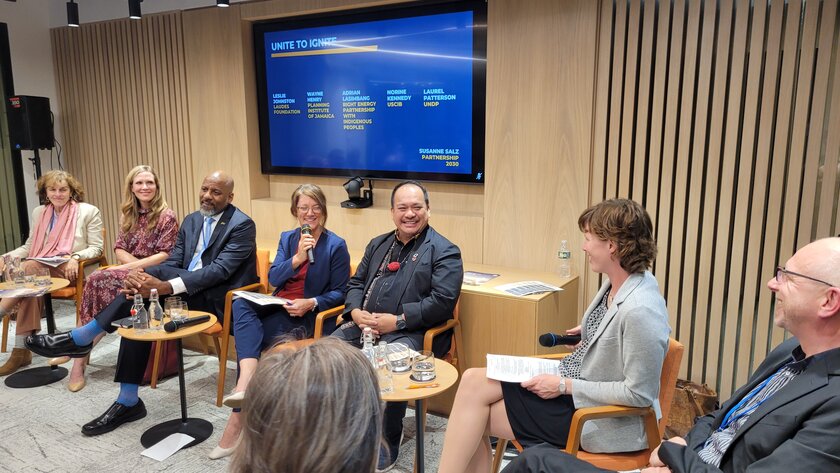Media
Further information
At the SDG action weekend on the 16 and 17 September, in the lead up to the SDG Summit and General Assembly, there was a sense that people were trying to balance these two ways of thinking. There is still hope and there is still aspiration. But rallying calls were tempered by many messages about how hard - or impossible? - it will be to get Agenda2030 back on track.
Setting the tone: we can’t ignore the challenges
The opening session featured a rallying call from the Secretary-General, but also an intriguing video demonstrating how challenging it was politically to get this agenda agreed in the first place. If this intended to demonstrate that the difficult bit was already done, it didn’t really work, instead adding to the sense of challenge; the implementation of the agenda being even more difficult than those tense negotiations in 2015.
And of course, it would be foolish to maintain unwavering positivity at this point. Anyone working with their governments on the SDGs knows it. And it is necessary for those of us supporting the implementation of the 2030 Agenda to recognise the challenges. If we don’t, we won’t be able to find more effective ways of working than we have up to now.
Multi-stakeholder partnerships for the SDGs: there is still hope
Many were talking anxiously about negative shifts across many countries in government’s appetite or ability to achieve the SDGs. But there are also several reasons not to give up hope. For one thing, achieving the SDGs shouldn’t only depend on government anyway. All of society has both the responsibility for the SDGs and a role in achieving them.
And, crucially, there are also known, practical and actionable ways of tapping into this whole-of-society approach that haven’t yet been fully exploited. One of the most powerful of these are the multi-stakeholder partnerships (MSPs) captured in SDG 17.
This may be why the action weekend offered a higher proportion of side events than previously which featured or mentioned partnership. Even in many sessions not explicitly focused on partnering, the P- word was on many people’s lips.
Multistakeholder platforms: partnering wisdom from Global Forum members
As a member of the secretariat of the Global Forum, I want to reflect for a moment on a specific side event, which took place on Saturday 16th and focused on the role of multi-stakeholder platforms. Organised by the Government of Finland, UN Global Compact Indonesia, UN Global Compact Finland and TPI, it featured inputs from three panel speakers who were current or former representatives of members of the Global Forum.
The panel spoke about how partnerships enable stakeholders with apparently contradictory goals to discover how they complement and support each other, and to set out a positive vision for transformative change.
They talked about the partnerships between MSPs and government, with the most value being created for all involved when there are long term structures in place for this partnering to deepen. This can ensure that the voices of many communities are reflected during key moments such as Voluntary National Reviews (VNRs) but then also report back and sustain momentum.
Panel speakers also were intensely pragmatic about how such multi-stakeholder platforms should go about their work. Their value lies in offering options that are not political, but always mindful that policy depends on politics. They were also very practical: advice that platforms provide to decision makers must be bold, but also short, as those in government do not have the time to read long documents.
Turning to the private sector, the panel reflected that companies respond well when there are focussed initiatives that meet a business purpose, such as sharing best practice on international standards on topics such as human rights. Platforms can also support partnerships between the public and private sectors, making sure they are benefitting from good and responsible partnering practice.
Unite to Ignite: what we all can do to enable more partnerships
The action weekend also saw the launch by the Global Forum and our partners of a new report – Unite to Ignite: Accelerating the transformational power of partnerships for the SDGs and beyond – it offers a highly practical and evidence-based analysis on what is needed at many different levels to enable a step-change in the number and effectiveness of MSPs for the SDGs.
The report recognises the challenges, including what is not yet in place in the way of structured and accessible training, support, policies and funding to name just a few.
But it also provides hope. There are proven ways for all the negatives to be addressed now, within the resources available for the SDGs, and within the agreed political priorities.
In the new Global Forum checklist, which features in the report, Global Forum members, and others, share their knowledge of how their governments can build trust, engage their citizens, and unleash a society-wide movement that will make achieving the SDGs a possibility.
The report is full of many other such insights that, if put into practice, will result in impact at every level of partnering for the SDGs. We know they work, as respondents to the survey and interviews from which the report was compiled tell us so. But they also share that much more is needed. Good partnering practice need to be much more prevalent and part of the enabling systems for the 2030 Agenda.
Conclusions: partnerships can light the way to the SDGs
So we can be hopeful – but not blindly so - about achieving the SDGs. We know now what the challenges are, but we have ways of doing better through more, and better, partnering. When it is more widely recognised that there are such ways forward, then hope and aspiration need not be as tempered by hard messages as they are right now.




